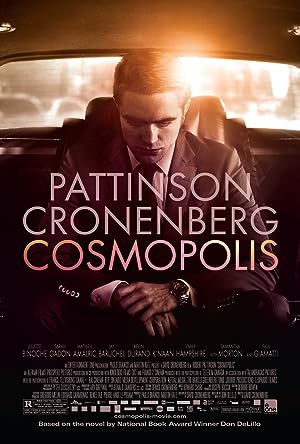Cosmopolis is about a particularly hectic day in the life of an asset manager who decides that he wants a haircut, spends the majority of time in his secure stretch limo as he struggles to get across town while facing various obstacles such as the President’s motorcade, protestors and a funeral procession of a famous music artist. As the journey progresses, he goes from exhibiting extreme self-preservation to extreme self-destructive behavior. For example, he is obsessed with his computer systems not being penetrated yet has daily proctologist exams, which he seems to get more sexual pleasure from than actual sex.
He occasionally leaves his limo to share each meal with his wife or have intercourse, verbal or otherwise, with a variety of characters. A number of characters have an audience with the king in his limo and give long detailed speeches that are probably philosophically significant, but ultimately washed over me with no trace of meaning. He is apparently trying to shed his affluent skin (he sheds an item of clothing in each scene) and return to his humble origins or alternatively to feel again, but ultimately fails. The natural culmination of his predatory business practice is bloodshed-his or others. His identity crisis leads to chaos around him, but it takes extreme effort to not remain untouched. In the end, there are no real consequences to any of his actions based on the ambiguous ending.
Cosmopolis is heavy-handed in its approach to soulless tycoons of Wall Street and protests like Occupy even though it predates the economic crisis of 2008. Cosmopolis feels more like a play than a movie so when he leaves the limo, the scenes somehow feel less real. Is Cosmopolis an unofficial sequel to Crash? Because I am committed to watching all movies directed by David Cronenberg, I added Cosmopolis to my queue. Cronenberg films generally deal with horror, and he secretly revels when order disintegrates into chaos. Cosmopolis fits Cronenberg’s style, but the destruction is so mannered, controlled and stylized, it failed to emotionally resonate for me. I didn’t care about the consequences.
I was not excited to see Cosmopolis because it stars Twilight’s Robert Pattinson. I think Robert Pattinson’s head is weird. His lips are an odd shade of red. When his face expresses emotion, it feels like an impersonation of emotion by an alien or a robot. I suppose that was an asset for Cosmopolis since he plays a young, wealthy, self-destructive possible sociopath, but his eternal presence on screen made it difficult for me to watch Cosmopolis. Instead of making me a fan, Pattinson’s performance in Cosmopolis solidified my earlier judgments.
Cosmopolis’ best performances were from Emily Hampshire and Juliette Binoche because they felt like real people instead of symbols or mental concepts that failed to translate from paper to screen. Every time that I saw Kevin Durand, I thought that he was going to kill a vampire (The Strain kind, not the ones from Twilight). That isn’t a bad thing, but it was what I was thinking.
I think that if you read the book, you would probably get more out of Cosmopolis than I did. Philosophy fans may also enjoy it. Cosmopolis probably improves upon repeated viewings, but I will not watch it more than once intentionally. Even Cronenberg fans may find Cosmopolis a bit anemic.
Stay In The Know
Join my mailing list to get updates about recent reviews, upcoming speaking engagements, and film news.





